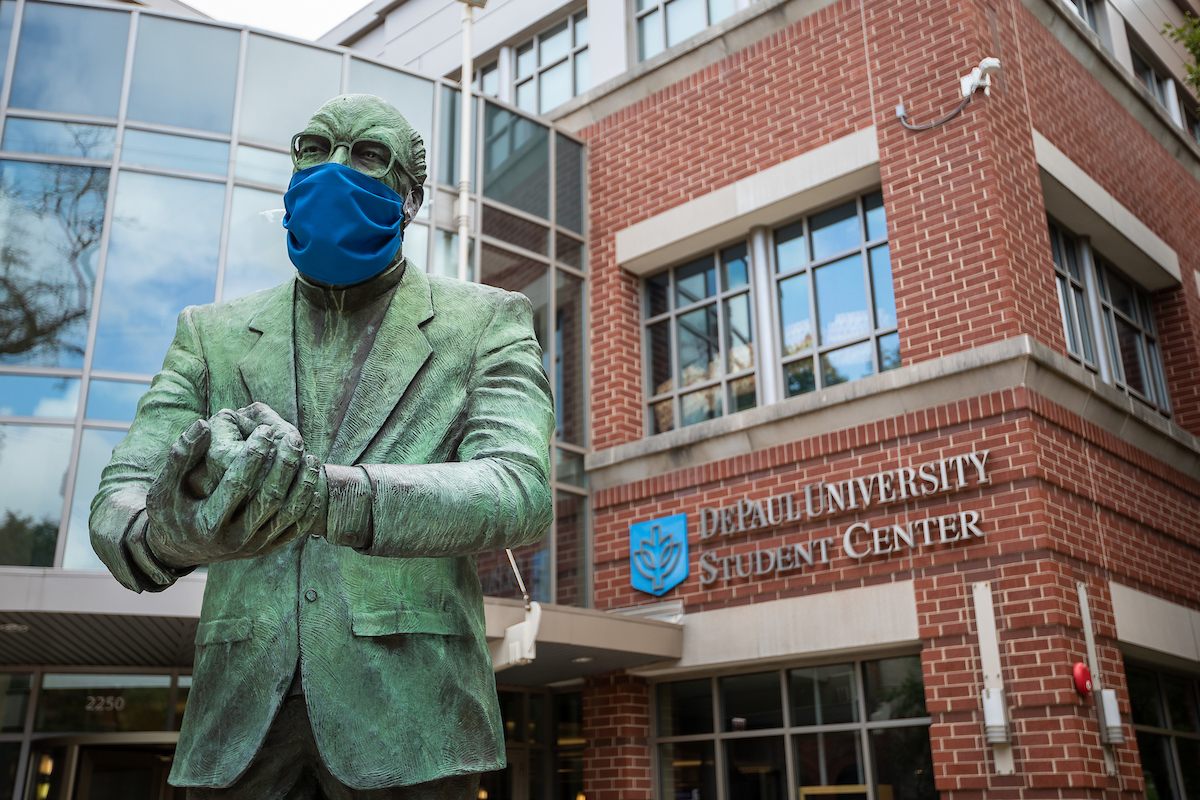 (DePaul University/Jeff Carrion)Contact tracing plays a critical role in DePaul's efforts to help slow the spread of COVID-19. According to the
Centers for Disease Control and Prevention, DePaul's contact tracers help reduce the spread of the virus by:
(DePaul University/Jeff Carrion)Contact tracing plays a critical role in DePaul's efforts to help slow the spread of COVID-19. According to the
Centers for Disease Control and Prevention, DePaul's contact tracers help reduce the spread of the virus by:
- Informing those who may have been exposed to the virus.
- Asking them to monitor their health for symptoms of COVID-19.
- Helping those exposed get tested.
- Requesting people
self-isolate if they have tested positive for COVID-19 or
self-quarantine if they were a close contact.
Who are DePaul's contact tracers?
DePaul's contact tracing team is led by Shannon Suffoletto, director of the Office of Health Promotion and Wellness and interim director of University Counseling Services, and Cheryl Hover, associate director of emergency management. Working alongside the Chicago Department of Public Health, Suffoletto and Hover have experience with contact tracing efforts for on-campus communicable illnesses.
DePaul's contact tracing team consists of staff members from across the university. They have completed Johns Hopkins University training on contact tracing and are well-versed on DePaul-specific protocols and procedures.
Case versus close contact
A case is someone who has tested positive for COVID-19 or has been diagnosed with COVID-19 by a medical professional.
A close contact is someone who has been in close physical contact with a case, within six feet for 15 minutes or more, while a case was potentially infectious.
Tested positive for COVID-19
After identifying as a positive case using DePaul's
online reporting system, contact tracers will reach out to the case by phone, sometimes more than once. They will ask cases to:
-
Self-isolate.
- Outline their symptoms to help the contract tracer understand when they were infectious on-campus.
- Provide a list of possible DePaul close contacts.
Identified as a close contact
Once someone is identified as a close contact, the contact tracing team will inform them, ask them to
self-quarantine for 14 days after their last known exposure to the case and monitor for any new symptoms.
Contact tracers: Caring for others
A part of the contact tracing team's job that is not widely known is that they also provide assistance to those affected.
Contact tracers will ask cases and close contacts to provide information about how they plan to address their basic needs when they're in self-isolation or quarantine. If a case or close contact needs assistance during the challenging time, contact tracers can help them get essentials like groceries, supplies and, if needed, medical care and mental health resources. They can also connect student cases and close contacts with resources to help them succeed academically.
Confidentiality
DePaul's contact tracers take privacy seriously. Throughout the entire contact tracing process, the privacy and dignity of every person will be respected. The identities of cases and close contacts will never be shared publicly.
All will remain anonymous.
Role of managers and supervisors
If a supervisor or manager learns of an employee testing positive for COVID-19, or otherwise diagnosed as a case by a medical provider, they must report it using DePaul's
online reporting system. After reporting a case, they cannot share the identity of the case with anyone else, as outlined by the CDC, and cannot engage in any type of investigation.
Learn more
For more information on DePaul's contact tracing efforts, review
DePaul's Health, Wellness and Prevent FAQs. Also take a moment to review and commit to the
DePaul Community's Health and Safety Pledge, and regularly visit the Fall 2020
website for more information, guidance and resources on the university's preparations for fall.
Thank you for taking care of each other. We're all in this together.